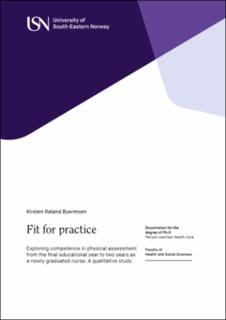| dc.contributor.author | Byermoen, Kirsten Røland | |
| dc.date.accessioned | 2023-09-12T11:18:41Z | |
| dc.date.available | 2023-09-12T11:18:41Z | |
| dc.date.issued | 2023 | |
| dc.identifier.isbn | 978-82-7206-798-3 | |
| dc.identifier.uri | https://hdl.handle.net/11250/3088859 | |
| dc.description.abstract | Background: Nurses’ competent use of physical assessment is needed to detect
deterioration and initiate interventions to prevent complications from occurring.
Research shows that nursing students and nurses do not perform physical assessment
during daily practice, as taught on campus. Identified barriers are complex and
multifaceted, with contextual differences, lack of time, lack of role models and overall
workload as some of the reasons. Several studies recommend reducing the scope of
physical assessment curriculum in undergraduate nursing education to overcome the
barriers. In 2015, on one University of South-Eastern Norway campus, we developed
and introduced a pedagogical education model designed for learning and practising
physical assessment.
Little is known about (a) students’ development of competence in physical assessment
during their last year as an undergraduate and (b) the reasoning processes
accompanying their performance and learning. Furthermore, no identified studies have
explored this in depth, following the same students as they become newly graduated
nurses. The motivation for the current study was thus to understand how the students
practised physical assessment with patients; how they perceived their own competence
development; and how the clinical context supported their learning process.
Aim: The aims of this dissertation were threefold: (1) to explore nursing students’ use
of physical assessment during their clinical rotations in two consecutive rotations in their
last educational year, (2) to explore the development of competence in physical
assessment from the last educational year to two years after graduation, and (3) to
explore contextual factors facilitating or hindering the use of physical assessment.
Developing competence in physical assessment is a complex process which
transforms one’s view of what physical assessment is and how it can become an
integrated part of person-centred fundamental care. However, educators and nurse
managers are important to building a supportive learning environment that scaffolds
both nursing students’ and newly graduated nurses’ continuing practise of physical
assessment. Reflective practice – in which students perform assessment based on a
symptom-based approach and clinical reasoning – may facilitate a more targeted
competence development, closing the gap between learning activities on campus and
in the clinical environment. Findings also indicate that close collaboration between
educational institutions and the clinical environment would enhance nursing students’
and newly graduated nurses’ further physical assessment use and development.
Researchers, educators, nurse managers, nurses and nursing students can benefit from
these findings, as they provide new understandings of how competence in physical assessment is learned. However, future studies should explore how different clinical
contexts, learning environments, and the roles of precepting nurses and nurse managers
influence and scaffold the development of competence in physical assessment.
Moreover, explorations of how the influencing factors inform the overall clinical
judgment competence in both nursing students and nurses need further elaboration. | en_US |
| dc.language.iso | eng | en_US |
| dc.publisher | University of South-Eastern Norway | en_US |
| dc.relation.ispartofseries | Doctoral dissertations at the University of South-Eastern Norway;172 | |
| dc.relation.haspart | Paper 1: Byermoen, K. R., Brembo, E. A., Egilsdottir, H. Ö., Heyn, L. G., Moen, A., & Eide, H. (2021). Reflection on actions: Identifying facilitators of and barriers to using physical assessment in clinical practice. Nurse Education in Practice, 50, 102913. https://doi.org/10.1111/jan.15631 | en_US |
| dc.relation.haspart | Paper 2: Byermoen, K. R., Eide, T., Egilsdottir, H. Ö., Eide, H., Heyn, L. G., Moen, A. & Brembo, E. A. (2022). Nursing students’ development of using physical assessment in clinical rotation—a stimulated recall study. BMC Nursing, 21, 110. https://doi.org/10.1186/s12912-022-00879-1 | en_US |
| dc.relation.haspart | Paper 3: Byermoen, K. R., Brembo, E. A. Egilsdottir, H. Ö., Eide, T., Heyn, L. G., Moen, A. & Eide, H., (2023). Newly graduated nurses use and further development of assessment skills— an in-depth qualitative study. Journal of Advanced Nursing, 00, 1-13. https://doi.org/10.1111/jan.15631 | en_US |
| dc.rights | Attribution-NonCommercial-NoDerivatives 4.0 Internasjonal | * |
| dc.rights.uri | http://creativecommons.org/licenses/by-nc-nd/4.0/deed.no | * |
| dc.subject | Physical assessment | en_US |
| dc.subject | Clinical reasoning | en_US |
| dc.subject | Clinical judgment | en_US |
| dc.subject | Competence development | en_US |
| dc.subject | Learning | en_US |
| dc.subject | Person-centred fundamental care | en_US |
| dc.subject | Nursing education | en_US |
| dc.subject | Newly graduated nurse | en_US |
| dc.title | Fit for practice: Exploring competence in physical assessment from the final educational year to two years as a newly graduated nurse: A qualitative study | en_US |
| dc.type | Doctoral thesis | en_US |
| dc.description.version | publishedVersion | en_US |
| dc.rights.holder | © The Author, except otherwise stated | en_US |

